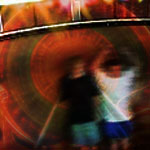 Mexico was a traumatic experience when I was a kid. With my brother I traveled to the Yucatan in 1982, where our uncle guided us strategically away from pesky familiarity of tourist traps and civilization, and toward the less trafficked areas replete with local color. A socially stunted thirteen year old, I would have found a trip to a new Radio Shack almost seizure-inducingly overwhelming. Not used to being out in the sun, my skin had a eerie computer club paleness. I was lanky, and wore my white tube socks pulled up to my knees. I was foreign to this world, and it rejected me like some incompatible transplant. Especially in Mexico.
Mexico was a traumatic experience when I was a kid. With my brother I traveled to the Yucatan in 1982, where our uncle guided us strategically away from pesky familiarity of tourist traps and civilization, and toward the less trafficked areas replete with local color. A socially stunted thirteen year old, I would have found a trip to a new Radio Shack almost seizure-inducingly overwhelming. Not used to being out in the sun, my skin had a eerie computer club paleness. I was lanky, and wore my white tube socks pulled up to my knees. I was foreign to this world, and it rejected me like some incompatible transplant. Especially in Mexico.
Adversity lay in wait for us at every turn, and I remember clearly the flat tire we got on an uneven dirt road overgrown by high grass, and our subsequent rescue by two shady men in a rust-eaten van. And there was the drunk who threw his arm around me, shouting “iNo puedo leer!” And there was my paroxyism-racked bout with sun poisoning, hardly soothed by the the hastily prescribed nostrum of the local medic. And there was our uncle’s food poisoning, which prompted several men to come into our hotel room to take him away, leaving my brother and I alone in Mexico, maybe forever.
But other than those few incidents I managed to be completely miserable.
Having finally made it to a small town in Quintana Roo, our uncle lightened up on the culture aspect of the trip and agreed to take us to a street carnival that had been set up in a nearby parking lot. But not before reminding us that parking lot rides were no substitute for experiencing the flavor of the real Mexico. I thought he might be referring to the tainted fruit, but I was looking forward to something a little less vomit-oriented.
The sun had fallen hours ago, but the air was still thick from a day’s heat. Colored lights through the park’s trees brought our shoes scuffling across the lot’s graveled asphalt, stronger with each step. There was a distinctly Latin sound to the calliope music, and the shouts over the metallic, mechanical surf of roller coasters were foreign, though interpreted easily enough.
At the edge of the carnival grounds stood an idle attraction: the centrifuge. This is a concept ride more than it is an experience ride, and a diabolical one at that. On an experience ride one derives enjoyment from a journey of discovery and surprise. The concept ride is something understood at first glance, and it’s usually the destination one seeks rather than the experience. That is, once the concept is understood, it’s survival that one most looks forward to. But a kid, intoxicated by spectacle, will be gleefully indiscriminate when it comes to attractions.
My brother and I, our pupils dilated with awe, tugged our uncle toward the contraption like rabid dogs tugging at their leashes. He wasn’t interested though, and released us to our own fates. He said he was going for a walk instead. Down in the cylinder, our backs against the padded wall, we looked up at the operator as he barked down some unintelligible words. I saw that he was actually younger than I was, surely an indication that this carnival had enough of that Mexican flavor to satisfy anyone. Were we doing this right? There was not time to contemplate this, as the hum beneath our feet tugged the world above into a labored spin.
As the cylinder approached a certain velocity there was a hydraulic whine from below, and the floor began to drop away. The principle, of course, is that the centrifugal force brought on by the rotation is just enough to keep objects fastened to the inside rim of the wall. And indeed, the novelty of being pinned did provide a few minutes of amusement. My brother and I wondered aloud what would happen if we spat, which is just about when the operator felt it was time for a little midnight constitutional, and left my brother and me to our business. I looked down at my feet and saw that I had actually dropped a couple of inches, and that my ankles now hung down past the lip where the floor met the wall. I suddenly had the image of the floor coming back up and crushing my ankles like a trash compactor. Inching upward was exceedingly taxing, but I was motivated by this possibility. “Are you slipping?” I called to my brother. I thought at first that the trick was to be as still as possible, but the fact was that the centrifuge was not spinning fast enough to keep us in place. We’d been in there for about four minutes when I began to get dizzy with the exertion of trying to stay above floor level.
The operator was nowhere in sight.
I was thinking about standards. Surely there were international standards for the operation of such machines. There was nothing to worry about. The operator, young though he may have been, was obviously so experienced that he wasn’t concerned, and watching over us would have been overkill. Anyway, another minute or so and we’d be off and heading toward the next ride.
But minutes crept by and there was no one in sight. In fact, the operator had probably left to go mug our uncle, who was even now being held at gunpoint in some dingy room with a naked bulb swinging back and forth overhead casting sharp shadows against rotting walls. I was sweating from the heat and my nose was running. I glanced up at the trees twirling by overhead and felt nausea setting in. “I’m definitely slipping,” I called out to my brother. If this went on for much longer I feared it would be my consciousness that would be slipping.
Eight minutes into the ride I wiped my nose, leaving a fresh red streak across my forearm. I sniffed instinctively as I tried to recall what the operator had told us as we’d boarded the ride. Perhaps it had been, “This centrifuge requires some repairs.” Or maybe, “I need to go find you some barf bags, I’ll be back.” Or even, “I don’t work here, what does this handle do?” Every muscle sang from fatigue as I tried to keep from dropping into the darkness below, inching up the sweaty wall one body part at a time.
At ten minutes into the ride I was trying to think of happy things, and testing to see whether it was easier to hold my bile with my eyes closed or open. Closed? Open? I had images of astronauts in my head, their cheeks stretched back toward their ears as they underwent similar centrifugal forces.
And that’s when the operator returned.
I was beyond feeling any anger toward him. My primary thought centered around keeping my feet from being clipped off at the ankle long enough to find solid ground.
In the parking lot my brother and I stood as still as possible. I swallowed repeatedly, and stared at the ground, which appeared to be spiraling slowly away. Our uncle found us again just as the effects of the centrifuge were wearing off, and he told us of another ride he’d found that we’d probably enjoy. He pointed at an imposing device with eight arms. From each arm dangled three fiberglass cars, which the machine shook about like tassels on an exotic dancer. I wiped another red streak down my other forearm and considered the beast. The young are resilient, and trauma doesn’t last when the world’s moving fast. My brother and I looked at each other through dilated eyes, and then tore off to the next contraption.
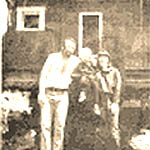 The City seems impersonal more often than not, particularly when I compare it to the intimacy of the household I grew up in. Over the holiday, in the ebb of the din, I found myself with some spare moments during which to reflect on the way things were: three generations packed into a caravan, surviving the summer’s heat in our threadbare underclothes, ripe as an open can of meat.
The City seems impersonal more often than not, particularly when I compare it to the intimacy of the household I grew up in. Over the holiday, in the ebb of the din, I found myself with some spare moments during which to reflect on the way things were: three generations packed into a caravan, surviving the summer’s heat in our threadbare underclothes, ripe as an open can of meat.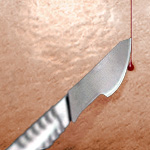 People in Virginia, you tell them you’re moving to California and they all chuff and get that same look in their eye. I call it the, “So sleeping with your own family members ain’t good enough for ya now?” look. According to Virginians, we on the west coast all lead lives of frivolity and perversion. I say fine, let them think that. There’s no point in arguing with someone whose idea of couture is possessing lawn furniture that will accommodate their gigantic asses.
People in Virginia, you tell them you’re moving to California and they all chuff and get that same look in their eye. I call it the, “So sleeping with your own family members ain’t good enough for ya now?” look. According to Virginians, we on the west coast all lead lives of frivolity and perversion. I say fine, let them think that. There’s no point in arguing with someone whose idea of couture is possessing lawn furniture that will accommodate their gigantic asses.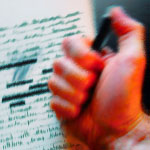 Process-eez. The word haunts me, only it’s not a word. Not where I come from. But a word doesn’t have to be a real word to be worthy of loathing. It can be the sound the word makes as it slides over the palate, or merely the image it invokes. Me, I’ve always been sensitive to texture. With food it’s not so much the taste that turns me off, but how it feels on my tongue (not to mention whether I suddenly realize that I’m eating, which is another horrifying topic). Sounds can hold terrifying power as well: the sound of an old man swallowing his apple sauce, or the crinkle of napkins, or the dull chalky drag of teeth across drywall. And what are words but choreographed sound?
Process-eez. The word haunts me, only it’s not a word. Not where I come from. But a word doesn’t have to be a real word to be worthy of loathing. It can be the sound the word makes as it slides over the palate, or merely the image it invokes. Me, I’ve always been sensitive to texture. With food it’s not so much the taste that turns me off, but how it feels on my tongue (not to mention whether I suddenly realize that I’m eating, which is another horrifying topic). Sounds can hold terrifying power as well: the sound of an old man swallowing his apple sauce, or the crinkle of napkins, or the dull chalky drag of teeth across drywall. And what are words but choreographed sound? Mexico was a traumatic experience when I was a kid. With my brother I traveled to the Yucatan in 1982, where our uncle guided us strategically away from pesky familiarity of tourist traps and civilization, and toward the less trafficked areas replete with local color. A socially stunted thirteen year old, I would have found a trip to a new Radio Shack almost seizure-inducingly overwhelming. Not used to being out in the sun, my skin had a eerie computer club paleness. I was lanky, and wore my white tube socks pulled up to my knees. I was foreign to this world, and it rejected me like some incompatible transplant. Especially in Mexico.
Mexico was a traumatic experience when I was a kid. With my brother I traveled to the Yucatan in 1982, where our uncle guided us strategically away from pesky familiarity of tourist traps and civilization, and toward the less trafficked areas replete with local color. A socially stunted thirteen year old, I would have found a trip to a new Radio Shack almost seizure-inducingly overwhelming. Not used to being out in the sun, my skin had a eerie computer club paleness. I was lanky, and wore my white tube socks pulled up to my knees. I was foreign to this world, and it rejected me like some incompatible transplant. Especially in Mexico. The usher is using a small flashlight to show people where their seats are. The way he wields it it’s not even a tool, but rather an extension of himself. He has one normal hand, and one lightbulb hand that exists to show people where to sit. In fact when someone approaches him to ask about something not related to sitting, “Pardon me, where are the restrooms?” he uses his lightbulb hand to point up the aisle, and then to the right. That’s not the use his lightbulb hand was intended for, but already he’s adapted. If he had an itch I’m sure he would scratch it using the warm red glow of his lightbulb hand. Later that night he finds himself frustrated as he tries to feed himself with it. Foiled by the lack of articulation in their lightbulb hands, his species will eventually die out, their bulbs fading, eventually, to permanent darkness.
The usher is using a small flashlight to show people where their seats are. The way he wields it it’s not even a tool, but rather an extension of himself. He has one normal hand, and one lightbulb hand that exists to show people where to sit. In fact when someone approaches him to ask about something not related to sitting, “Pardon me, where are the restrooms?” he uses his lightbulb hand to point up the aisle, and then to the right. That’s not the use his lightbulb hand was intended for, but already he’s adapted. If he had an itch I’m sure he would scratch it using the warm red glow of his lightbulb hand. Later that night he finds himself frustrated as he tries to feed himself with it. Foiled by the lack of articulation in their lightbulb hands, his species will eventually die out, their bulbs fading, eventually, to permanent darkness.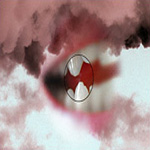 Dear Diary,
Dear Diary,